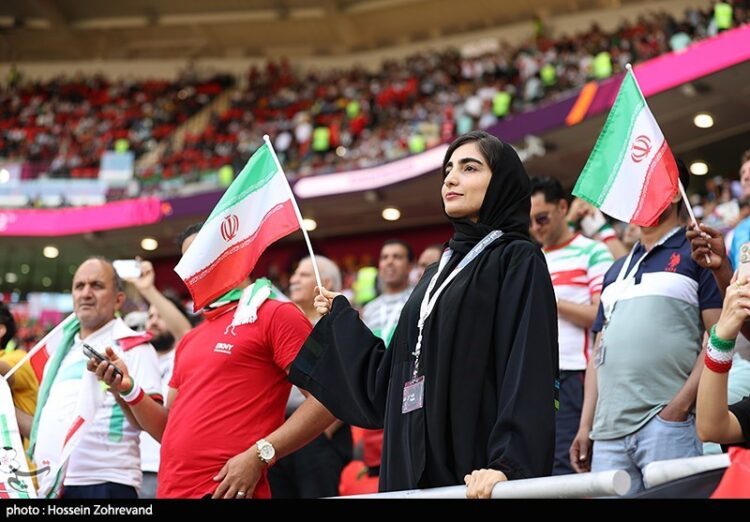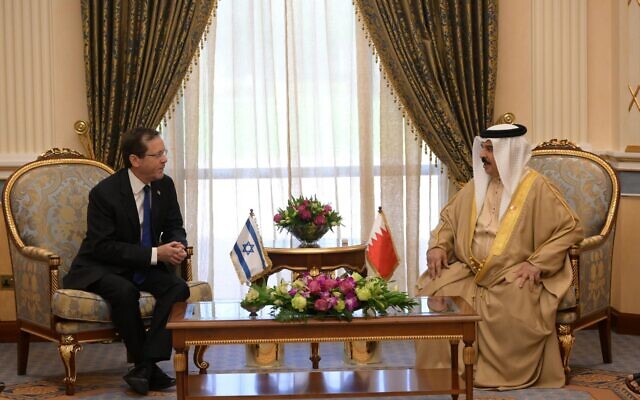When the Israeli government announced that its citizens would be permitted to fly to Qatar to attend the World Cup and that a team of Israeli diplomats would offer them consular services for the duration of the competition, there was a fleeting moment of euphoria in Israel.
Israel basically negotiated the arrangement with the International Football Association, and Qatar — an Arab nation that has neither diplomatic relations nor an aviation agreement with the Jewish state — quietly accepted the plan.
Upwards of 4,000 Israelis bought tickets and flew to Qatar on charter flights from Ben-Gurion Airport to Hamad International Airport.
These developments led some Israelis to believe or hope that the Arab world was pragmatically coming to terms with Israel.
They assumed that the 2020 Abraham Accords — which has led to the gradual normalization of Israel’s relations with the United Arab Emirates, Bahrain, Morocco and Sudan, but has left the simmering Palestinian question unresolved — had brought fundamental change to the region.
Judging by what has transpired at the World Cup so far, this rosy assumption has been proven to be misplaced, if not mistaken.
While the accords have created government-to-government ties and have been beneficial for business elites, they have not broken down popular prejudices against Israel either in Qatar or the wider Arab world.
From almost day one, anti-Israel sentiment has surfaced at the World Cup, at which an Israeli team has not played since 1970.
While Israeli fans have enjoyed the games as much as any of the other spectators, they have kept a low profile so as to avoid unnecessary incidents.
Israeli journalists who have identified themselves as Israelis have run into an implacable wall of grassroots hostility when they have interviewed or tried to interview local residents.
Ohad Hemo, an Israeli television reporter, felt this backlash. As he told The New York Times, “The people of the Middle East — not the regimes — do not really accept Israel.” He added that these feelings will persist until Israel settles its conflict with the Palestinians.
Pro-Palestinian sentiment was particularly noticeable in the stadiums where the matches were played.
After Morocco defeated Spain in a penalty shootout, becoming the first Arab team to reach the quarterfinals, the Moroccan players posed for a picture with the Palestinian flag, in a bold demonstration of solidarity with the Palestinians.
Since the World Cup got under way, Arab fans have chanted pro-Palestinian slogans and raised banners inscribed with the words “Free Palestine.” During Tunisia’s game with France, an Arab man invaded the field waving a Palestinian flag.

“There is clearly not much love in the Arab world for Israel,” wrote Giorgio Cafiero, the chief executive officer of Gulf State Analytics, a consultancy company based in Washington, D.C. “The decades of humiliation, resentment and anger which many Arabs feel toward Israel cannot simply vanish with the signing of such normalization agreements.”
Wth the implementation of the Abraham Accords, the then Israeli prime minister, Benjamin Netanyahu, boasted that the resolution of the Palestinian issue was no longer a prerequisite for Arab recognition and acceptance of Israel.
He was only partially right.
The accords, brokered by Donald Trump during his presidency, have had a significant impact. They have shattered what still remains of the Arab economic boycott against Israel, yielded clear commercial benefits to both sides, and encouraged Israeli tourists to visit the United Arab Emirates, Bahrain and Morocco.
In addition, Israel has formed military ties with three of the signatories — Morocco, the United Arab Emirates and Bahrain, all of which share Israel’s fears of a resurgent, nuclear-armed Iran, the preeminent Shi’a power in the Middle East.
It was in this spirit that Isaac Herzog visited Bahrain on December 4, becoming the first Israeli president to be invited to the island kingdom.
He was welcomed at the airport by Foreign Minister Abdullatif bin Rashid al-Zayani, who later said he believed that Netanyahu, the prime minister-designate since the November 1 election, “firmly believes in peace as stated in the Abraham Accords.”

During his trip, Herzog was received by King Hamed bin Isa al-Khalifa, who voiced support of “a just, comprehensive and sustainable peace that guarantees the legitimate rights of the Palestinian people.”
The king’s comments were indicative of the fact that Israel cannot cavalierly sweep the Palestinian problem under the rug.
Yet money talks. As the World Cup unfolded, Israel and Morocco signed a deal under which Israeli and Moroccan companies, NewMed Energy and Adarco Energy, and Morocco’s National Office of Hydrocarbons and Mines, will drill for natural gas in the Atlantic Ocean off the coast of Morocco.
Despite these landmark manifestations of normalization, Saudi Arabia, a major Arab power and the seat of Islam, has declined to enter the Abraham Accords, saying it will not do so unless Israel finally resolves its dispute with the Palestinians.
Neighboring countries like Oman, Kuwait and Qatar have adopted a similar position.
Qatar, which briefly had low-level diplomatic relations with Israel following the 1993 Oslo peace accord, severed them after the outbreak of the second Palestinian uprising in 2000. For the past few years, however, Qatar has funnelled hundreds of millions dollars worth of economic aid to the Gaza Strip, which has been ruled by Hamas since 2006.
Qatar was compelled to admit Israelis to the World Cup, but it has no intention of normalizing relations with Israel unless the Palestinian issue is solved.
Arabs who rallied behind the Palestinian cause at the World Cup expressed exactly the same sentiment.
